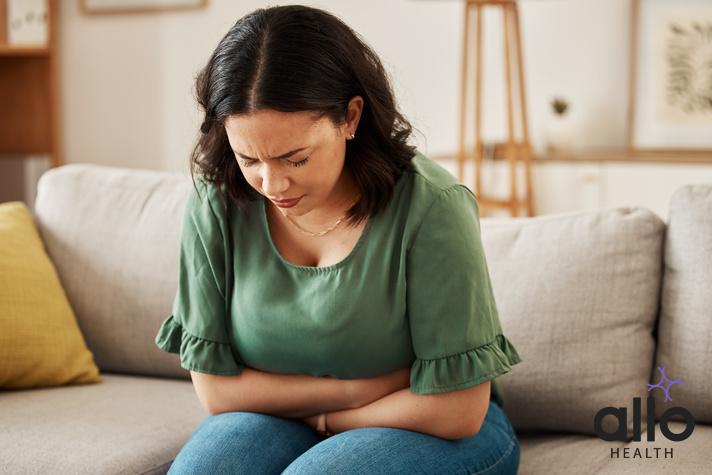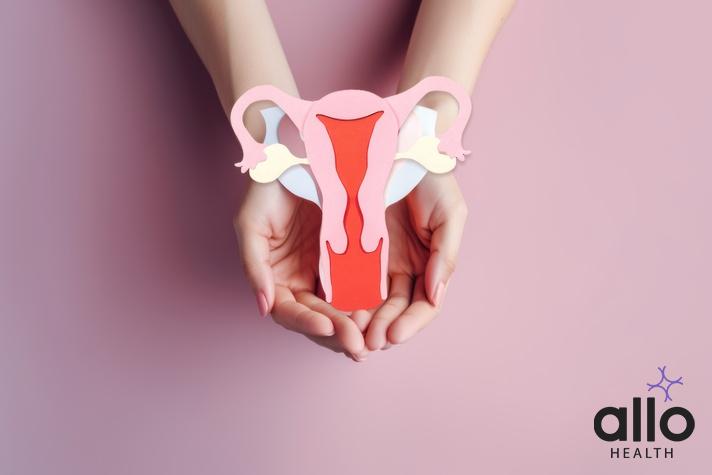Painful Sex After Menopause: Causes, Symptoms, and Effective Treatments

Allo Health is dedicated to personalized well-being, offering support and trusted information tailored to individual health goals. The platform emphasizes human-generated content, led by a distinguished medical team of experts, including physicians and sexual health specialists. Their commitment to credibility involves rigorous fact-checking, authoritative research, and continuous updates to ensure accurate, up-to-date information. Allo Health's unique approach goes beyond conventional platforms, providing expert-led insights and a continuous commitment to excellence, with user feedback playing a crucial role in shaping the platform's authoritative voice.

Dr. Aditi completed her undergraduate medical education at AJIMS, Mangalore, after which she worked in multi-speciality hospitals with COVID patients and in the Pain and Palliative medicine department. Driven by her experiences, she developed a keen interest in psychiatry. Dr. Aditi believes that mental health is just as, if not more important, than physical health.
Why This Was Upated?
Our experts continually monitor the health and wellness space, and we update our articles when new information became available.
Updated on 05 June, 2024
- Article was updated as part of our commitment to diversity, equity, and inclusion.

"The following blog article provides general information and insights on various topics. However, it is important to note that the information presented is not intended as professional advice in any specific field or area. The content of this blog is for general educational and informational purposes only.
Book consultation
The content should not be interpreted as endorsement, recommendation, or guarantee of any product, service, or information mentioned. Readers are solely responsible for the decisions and actions they take based on the information provided in this blog. It is essential to exercise individual judgment, critical thinking, and personal responsibility when applying or implementing any information or suggestions discussed in the blog."
Menopause is a natural stage of life during which a woman’s menstrual cycle comes to an end, typically occurring around the age of 50. While menopause signals the end of a woman’s reproductive years, it can also bring about various physical and hormonal changes, including painful sex. In this article, we will explore the reasons behind painful sex after menopause, its impact on postmenopausal women, and effective treatments to alleviate this discomfort.
What is Menopause?
Menopause is a natural stage in a woman’s life characterized by the cessation of her menstrual cycle, typically occurring around the age of 50. It marks the end of the reproductive years and is associated with a drop in estrogen levels, causing various physical and emotional symptoms.
Common symptoms of menopause include:
- Vaginal Dryness: A decrease in estrogen levels leads to vaginal dryness, which can result in painful intercourse (dyspareunia).
- Hot Flashes: Sudden, intense sensations of heat accompanied by sweating and flushing are prevalent during menopause.
- Mood Swings: Hormone level fluctuations can lead to mood swings, anxiety, and irritability.
- Low Libido: Reduced estrogen affects sex drive and may lead to a decline in sexual activity and satisfaction.
- Night Sweats: Hot flashes occurring at night may disrupt sleep patterns.
- Bone Loss: Decreased estrogen can contribute to bone density loss, potentially leading to osteoporosis.
- Irregular Periods: Before menopause, periods may become irregular, and eventually cease altogether.
Understanding these symptoms and their impact on a woman’s life during menopause is crucial. Seeking guidance from healthcare professionals and exploring treatment options such as hormone therapy or vaginal estrogen creams can help alleviate discomfort and ensure a smoother transition through this stage of life.
Effects of Menopause on Vaginal Health
Menopause has significant effects on vaginal health, primarily due to the drop in estrogen levels. This hormonal shift can result in several changes and discomforts:
- Vaginal Dryness: Menopause leads to a lack of estrogen, causing vaginal dryness, a key symptom. This dryness is often accompanied by itching and burning sensations, making sexual activity painful (pain during sex) and uncomfortable.
- Vaginal Thinning: The lack of estrogen can also lead to the thinning of vaginal tissues, making them more susceptible to damage and irritation (vaginal tissues).
- Decreased Lubrication: Estrogen helps maintain natural lubrication in the vagina, and its decline can lead to a lack of moisture, causing friction during intercourse (vaginal dryness).
- Loss of Elasticity: Vaginal tissues lose their elasticity, contributing to pain with penetration and deep pain during sex (deep pain).
- Impact on Sex Drive: Reduced estrogen levels can affect a woman’s sex drive and sexual desire (sex drive), leading to a decreased interest in sexual activity.
- Chronic Pain Condition: If left untreated, the consequences of these changes can lead to a chronic pain condition (chronic pain condition), negatively impacting a woman’s postmenopausal sex life (postmenopausal sex life).
Understanding these effects of menopause on vaginal health is crucial for postmenopausal women to seek appropriate treatments like hormone replacement therapy (HRT), vaginal estrogen, pelvic floor therapy, and lubricants (effective treatments). Consulting healthcare professionals for advice is essential to address these issues and maintain a healthy sex life during and after menopause (vaginal health).
Effects of Menopause on Sex Life
Menopause can have a significant impact on a woman’s sex life due to hormonal changes and physical alterations. Here are some effects:
- Vaginal Dryness: Declining estrogen levels can lead to reduced vaginal lubrication, causing discomfort and pain during intercourse.
- Low Libido: Changes in hormone levels may result in a decreased sex drive, making women less interested in sexual activity.
- Painful Intercourse: Vaginal dryness and thinning of vaginal tissues can lead to pain with penetration, making sex uncomfortable.
- Mood Swings: Hormonal fluctuations can affect mood, leading to anxiety or depression, which can indirectly affect one’s interest in sex.
- Hot Flashes and Night Sweats: These common menopausal symptoms can disrupt sleep and overall well-being, potentially impacting one’s sex life.
- Body Image Concerns: Menopausal changes in weight and body composition may affect self-esteem and body confidence in sexual situations.
- Relationship Stress: Physical and emotional changes can strain intimate relationships, requiring open communication and support.
It’s important to recognize these effects, seek medical advice, and explore treatment options to maintain a healthy and satisfying sex life during and after menopause.
Causes of Painful Sex After Menopause

Painful sex after menopause can be attributed to several key factors, primarily revolving around hormonal changes and their impact on vaginal health:
- Vaginal Dryness: The most prevalent cause is vaginal dryness, resulting from a drop in estrogen levels. This lack of estrogen leads to diminished vaginal lubrication, making intercourse uncomfortable and painful.
- Thinning Vaginal Tissues: Declining estrogen levels also contribute to the thinning of vaginal tissues. These tissues become less elastic and more prone to irritation, causing pain during sex.
- Lack of Estrogen: Reduced estrogen negatively affects overall sexual health, often resulting in a decreased sex drive and less interest in sexual activity.
- Physical Changes: Postmenopausal women may experience physical changes, including vaginal atrophy and a contraction of the vagina, making penetration painful.
- Symptoms of Menopause: Menopause symptoms such as hot flashes and night sweats can disrupt sleep patterns, leading to fatigue and reduced sexual desire, indirectly contributing to painful sex.
- Low-Dose Estrogen: In some cases, women on low-dose estrogen or estrogen by mouth may experience sexual pain as a side effect.
- Mental Health: Psychological factors, such as anxiety or fear of experiencing pain during sex, can also intensify discomfort.
Understanding the causes of painful sex after menopause is essential for seeking effective treatments and therapies, including hormone replacement therapy, pelvic floor therapy, and vaginal rejuvenation treatments, which can help alleviate these concerns and improve postmenopausal women’s overall sexual well-being and quality of life.
Treatment Options

Treatment options for painful sex after menopause are essential to help women regain their sexual comfort and overall well-being:
- Hormone Replacement Therapy (HRT): HRT is a common treatment that replenishes estrogen levels in postmenopausal women. This helps combat vaginal dryness and thinning, making sex more comfortable. Estrogen can be administered orally, topically (creams or rings), or vaginally, as low-dose vaginal estrogen, to target the affected tissues directly.
- Pelvic Floor Therapy: Pelvic floor physical therapy involves exercises and techniques to strengthen the pelvic muscles, improving vaginal elasticity and reducing pain during intercourse.
- Lubricants: Water-based or oil-based lubricants can provide immediate relief by reducing friction and discomfort during sex. They are especially helpful when vaginal dryness is the primary concern.
- Vaginal Rejuvenation Treatment: This medical procedure, sometimes called vaginal laser therapy, stimulates collagen production in vaginal tissues, restoring their health and reducing pain.
- Mental Health Counseling: Addressing emotional factors is crucial. Sex therapists and mental health professionals can help couples navigate the psychological aspects of painful sex, improving intimacy and communication.
- Consulting a Doctor: It’s essential for women experiencing painful sex to consult their healthcare professionals. Doctors can provide personalized guidance and recommend the most suitable treatment options based on individual needs and preferences.
The treatment options for painful sex after menopause encompass hormonal therapies like HRT, physical interventions like pelvic floor therapy, lubricants for immediate relief, vaginal rejuvenation treatments, and mental health counseling to address emotional factors. Consulting a healthcare professional is crucial to determine the best approach for each woman’s unique situation, promoting a healthier and more satisfying postmenopausal sex life.
Preventive Measures to Maintain a Healthy Sex Life After Menopause
Maintaining a healthy sex life after menopause is essential for overall well-being and intimacy. Here are some preventive measures to ensure a satisfying and enjoyable sexual experience during this stage:
- Open Communication: Maintain open and honest communication with your partner about your desires, concerns, and any physical changes experienced during menopause.
- Regular Physical Activity: Engage in regular exercise to boost mood, increase energy levels, and improve overall sexual health.
- Balanced Diet: Consume a well-balanced diet rich in fruits, vegetables, and whole grains to support overall health and vitality.
- Stay Hydrated: Proper hydration helps prevent vaginal dryness, a common concern during menopause. Drink plenty of water daily.
- Pelvic Floor Exercises: Practice Kegel exercises to strengthen pelvic muscles, enhancing sexual pleasure and reducing the risk of incontinence.
- Lubricants: Use water-based or silicone-based lubricants to reduce discomfort due to vaginal dryness during intercourse.
- Hormone Therapy: Discuss hormone replacement therapy (HRT) options with your healthcare provider to address hormonal imbalances affecting your sex life.
- Stress Management: Learn stress-reduction techniques such as meditation or yoga to alleviate anxiety and enhance sexual well-being.
- Regular Health Checkups: Visit your doctor for routine checkups to monitor your overall health, including sexual health.
- Sex Therapist: Seek guidance from a sex therapist or counselor to address any psychological or emotional concerns that may impact your sex life.
By incorporating these preventive measures into your lifestyle and seeking professional guidance when needed, you can maintain a healthy and fulfilling sex life even after menopause, ensuring a strong connection with your partner and promoting your overall well-being.
Conclusion
Painful sex after menopause is a common concern that many postmenopausal women face. However, it should not be a barrier to maintaining a healthy and fulfilling sex life during this stage of life. Seeking advice from healthcare professionals, exploring effective therapies, and addressing the physical and emotional aspects of sexual pain can help women navigate this challenging phase and continue to enjoy a healthy sex life during menopause. If you’re experiencing painful sex after menopause, don’t hesitate to consult your doctor for advice and explore the available treatment options, including hormone therapy, physical therapy, and lubricants, to improve your overall quality of life.
Most Asked Questions
-
What causes painful sex after menopause?
Painful sex after menopause is often caused by a drop in estrogen levels, which can lead to vaginal dryness and thinning of the vaginal tissues. This lack of moisture and elasticity can make intercourse uncomfortable.
-
How can I tell if I’m experiencing painful sex after menopause?
If you’re experiencing pain with penetration or deep pain during sex, especially after reaching menopause, you may be affected. It’s essential to discuss these symptoms with your doctor for proper evaluation.
-
What are the treatment options for painful sex after menopause?
Effective treatments include hormone replacement therapy (HRT) to boost estrogen levels, vaginal estrogen in the form of creams or tablets, pelvic floor therapy, and using lubricants during sex. Consulting with healthcare professionals can help you choose the right option for your needs.
-
Can painful sex after menopause be emotionally challenging?
Yes, it can be emotionally challenging. Painful sex can impact your self-esteem and overall well-being. Seeking support from sex therapists or mental health professionals can help address the emotional aspects of this concern and improve your overall mental and sexual health.






































